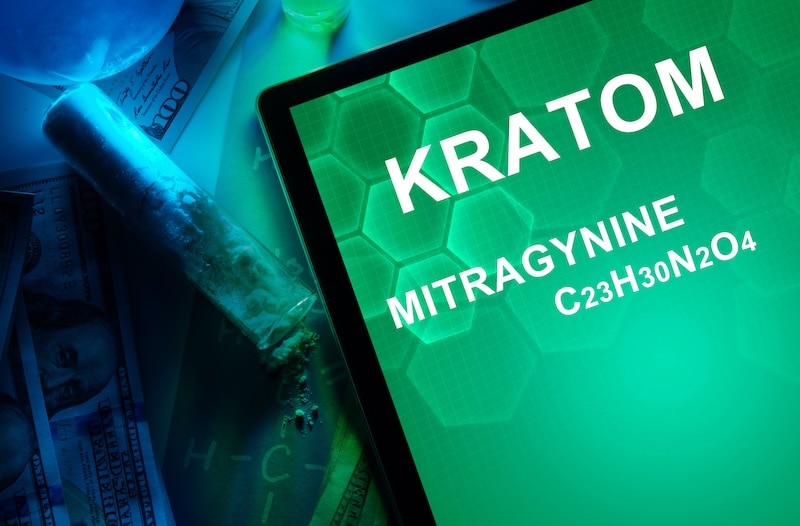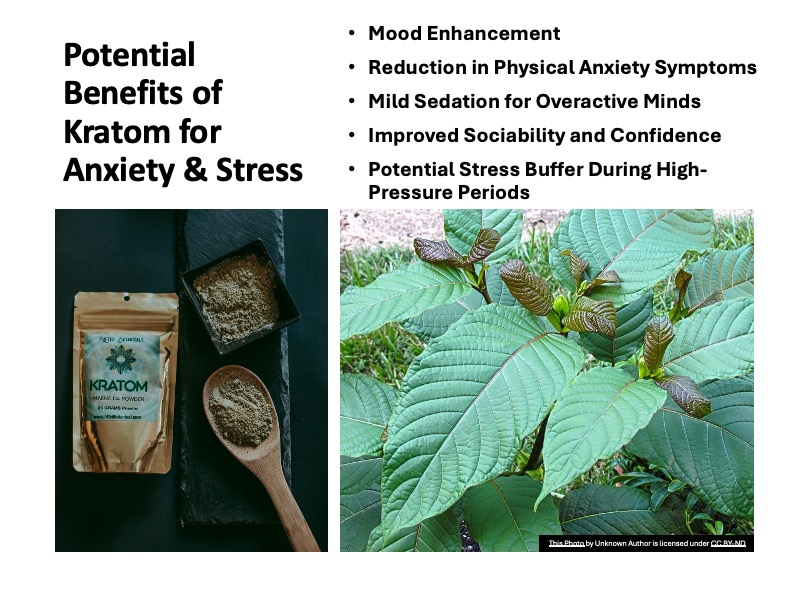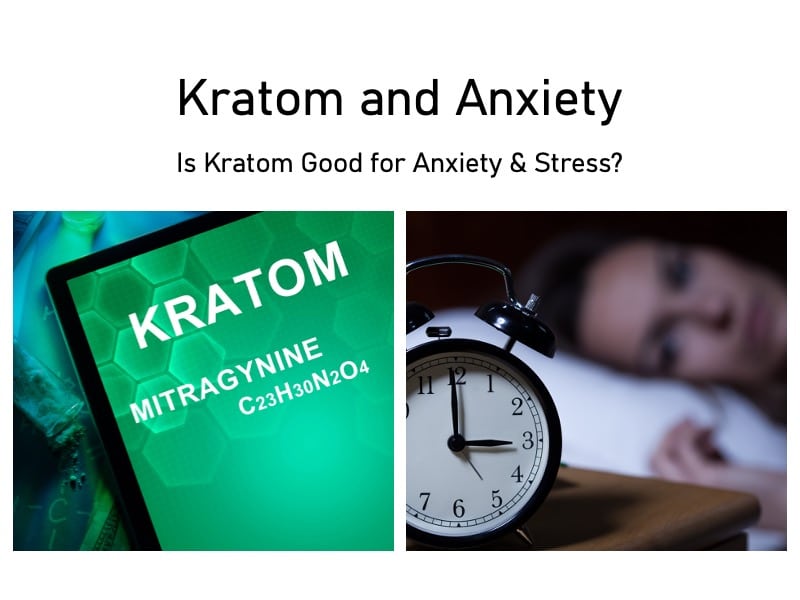Kratom and Anxiety: Is Kratom Good for Anxiety & Stress?
Kratom and anxiety have become increasingly linked in online wellness communities, as many people seek natural alternatives to manage stress, tension, and anxious feelings.
As someone who studies health and wellness trends professionally, I’ve also become interested in whether kratom is good for anxiety or if it’s just another overhyped herbal remedy.
Important: Understanding the potential benefits and risks of kratom for anxiety is essential before considering it as part of your wellness strategy. Always consult a licensed healthcare provider before using kratom, as they can help determine whether it’s safe or appropriate based on your personal health history and needs.
Kratom (Mitragyna speciosa) is a tropical plant traditionally used in Southeast Asia for both energy and relaxation, depending on the dose and strain.
In recent years, kratom has gained traction among individuals searching for plant-based relief from anxiety symptoms, especially those who are dissatisfied with conventional pharmaceuticals or looking for a more holistic approach.
Early research and anecdotal reports suggest that certain kratom strains may help promote calm, ease restlessness, and support mental clarity.
However, kratom’s pharmacology is complex, and its effects can vary significantly between users.
Understanding the potential benefits and risks of using kratom for anxiety is essential before considering it as part of your wellness strategy.
In this guide, I’ll break down the science behind kratom’s effects on anxiety and stress, highlight what current research says, and share how to approach kratom use responsibly and legally, especially if you’re navigating mental health challenges.
What Is Kratom?

Kratom (Mitragyna speciosa) is a tropical tree native to countries like Thailand, Malaysia, and Indonesia.
Traditionally, its leaves were used for their energizing or relaxing properties, depending on the amount consumed.
Today, kratom is gaining popularity among people looking for natural ways to promote calmness or relieve occasional feelings of overwhelm.
One of the major components often studied for its effects is 7-hydroxymitragynine, a naturally occurring alkaloid found in the kratom plant.
This compound is believed to play a key role in the relaxing sensations some users report.
However, everyone’s body chemistry is different, and the risks and benefits of kratom for stress and anxiety is crucial before trying it yourself.
Is Kratom Legal?
Kratom exists in a unique legal space in the United States.
While it is federally legal, it’s banned in certain states and municipalities, including Alabama, Arkansas, Indiana, Rhode Island, Vermont, Wisconsin, and some cities and counties.
Is Kratom a Dietary Supplement?
Despite being widely sold online and in stores, kratom is not legally recognized as a dietary supplement in the United States.
According to the U.S. Food and Drug Administration (FDA), kratom is considered a new dietary ingredient for which there is insufficient evidence to demonstrate safety.
As such, products containing kratom are classified as adulterated under section 402(f)(1)(B) of the Federal Food, Drug, and Cosmetic Act (FD&C Act).
Additionally, the FDA has ruled that kratom is an unsafe food additive, meaning it cannot be lawfully added to foods or beverages under section 409.
This makes any kratom-containing product unlawful for use as a supplement or conventional food under current U.S. law (FDA, 2023).
What Does Kratom Do?
Kratom (Mitragyna speciosa) leaves contain active compounds that can produce a range of effects on the body and mind depending on the dose, strain, and individual user.
Here is some information on what kratom does and how it makes you feel:
Stimulating Effects at Low Doses
At low doses (typically 1–5 grams), kratom tends to act as a mild stimulant, similar to caffeine. Users often report:
- Increased energy and alertness
- Enhanced focus and sociability
- Mood elevation or mild euphoria
This is partly due to alkaloids like mitragynine, which bind to certain receptors in the brain that affect alertness and mood.
Relaxing or Sedative Effects at Higher Doses
At moderate to higher doses (5–15 grams), kratom’s effects can shift dramatically. Many users report:
- Physical relaxation or mild sedation
- Reduced perception of pain
- Lowered anxiety and stress levels
- A general sense of calm or well-being
This is due to both mitragynine and 7-hydroxymitragynine, which interact with the body’s opioid receptors—but differently than conventional opioids.
Potential Pain Relief
Kratom is often used for natural chronic pain management, particularly among individuals seeking alternatives to prescription opioids.
It may relieve chronic pain, muscle aches, or arthritis-like symptoms without the same level of respiratory depression seen with traditional opioids (Swogger & Walsh, 2017).
Mood Enhancement and Anxiolytic Support
Some people use kratom for its potential to reduce anxiety or depressive symptoms, often describing a “warm” or comforting effect.
However, results are highly individualized, and not all users find it helpful for mood.
Potential Benefits of Kratom for Anxiety & Stress

While kratom is not a conventional treatment for anxiety or stress-related disorders, emerging evidence and user reports suggest that it may offer certain benefits for emotional regulation and mental well-being.
Although not proven or strongly research-based, these benefits vary significantly depending on the strain, dosage, and individual response.
Mood Enhancement
Many users report that specific kratom strains, especially red vein or green vein varieties, promote a more stable, positive mood.
Kratom’s alkaloids, particularly mitragynine and 7-hydroxymitragynine, interact with opioid and serotonergic receptors in the brain, which may mimic the calming effects of endogenous endorphins and serotonin.
These effects may help buffer against low mood and persistent worry when used responsibly and occasionally.
Reduction in Physical Anxiety Symptoms
Physical symptoms of anxiety, like muscle tension, restlessness, and rapid heart rate, can be exhausting.
Some users find that moderate doses of kratom offer muscle relaxation and a sense of physical calm, which may indirectly reduce the cycle of somatic stress fueling anxious thoughts.
Red vein strains, in particular, are associated with these sedative and calming effects.
Mild Sedation for Overactive Minds
At moderate to higher doses, kratom may help you sleep better and quiet racing thoughts. This sedative property can be useful for individuals who struggle with nighttime anxiety or overstimulation.
Important: Sedation may impair alertness, so proper timing and responsible use are essential.
Improved Sociability and Confidence
In lower doses, some kratom strains (especially white or green vein varieties) are reported to increase sociability and reduce social anxiety by promoting a sense of ease in communication and interaction.
While not a substitute for therapy or long-term anxiety treatment, these short-term effects may help in social situations or public speaking scenarios.
Potential Stress Buffer During High-Pressure Periods
In the 2021 case report by Müller et al., kratom use was linked to effective self-management of depression and anxiety over a long period, until external stressors (e.g., the COVID-19 pandemic) disrupted its effectiveness.
This suggests kratom may offer temporary relief for stress management in otherwise stable situations but is not a solution for severe or chronic anxiety (Müller et al., 2021).
Possible Risks and Side Effects of Kratom Use
Despite its benefits, kratom isn’t without risks. Side effects of using kratom for anxiety and stress can include:
- Nausea, dizziness, constipation
- Dependence with long-term use
- Withdrawal symptoms similar to opioids
- Legal and regulatory uncertainty in some areas
Research suggests kratom has a complex pharmacology and should not be viewed as harmless or universally safe (Henningfield et al., 2024).
Best Ways to Use Kratom for Stress and Anxiety
People exploring kratom for anxiety often experiment with different forms to find what feels most calming yet practical.
Each method comes with unique pros, cons, and safety considerations.
- Kratom tea is a traditional option. Gently steeping kratom leaves or powder in warm water can make the effects smoother and easier to digest, which many people find ideal for evening relaxation.
- Powder mixed in juice or smoothies is common too. This masks the bitterness but requires careful measuring to avoid excessive doses.
- Capsules remove the taste altogether and make dose control simple, though they may take longer to kick in, which is something to keep in mind if using kratom to settle nighttime restlessness.
- Ready-made drinks like Kratomade have gained popularity for their convenience and flavor. These pre-portioned kratom drinks can be a discreet option but vary widely in strength, so choosing reputable brands is key.
- Extracts or tinctures are highly concentrated. Some people use them for stronger calming effects, but they’re more likely to cause dependency and should be used with extreme caution.
No matter the form, start with a very low dose, watch your body’s response, and avoid mixing kratom with other substances that depress the nervous system. Responsible use—and speaking with a qualified healthcare provider—remains the safest approach for anyone considering kratom for anxiety relief.
Final Thoughts: Should You Try Kratom for Anxiety and Stress?
Kratom may offer value for individuals exploring natural, plant-based solutions to support emotional well-being.
For some, certain strains provide a noticeable sense of calm, reduced tension, and better resilience during stressful moments.
However, it’s important to view kratom for anxiety not as a cure, but as one possible tool within a broader mental health toolkit.
Its effects can vary widely depending on your individual biology, dosage, and even the source or strain of the kratom.
Legal status also differs across states and municipalities, so always research your local laws before considering use.
Thoughtful, responsible experimentation, ideally guided by a healthcare provider, can help you determine if kratom aligns with your personal wellness needs.
That said, not every natural remedy for stress works for everyone.
If kratom doesn’t feel like the right fit for you, there are other evidence-supported strategies to explore.
For example, CBD has become increasingly popular and accessible for anxiety, with a growing body of research supporting its calming and anxiolytic effects.
Additionally, lifestyle changes like incorporating exercise for mental health play a critical role in anxiety management.
Regular movement not only boosts mood and confidence but can also biologically reduce cortisol levels and promote neurotransmitter balance.
Similarly, prioritizing the best foods for mental health, such as those rich in omega-3s, magnesium, and B vitamins, can contribute to greater emotional stability.
If you’re looking to help someone with mental health problems, keep in mind that support doesn’t always mean offering solutions.
Sometimes, it’s about listening, sharing information, or helping them find safe and evidence-based options, whether that’s therapy, lifestyle interventions, or integrative approaches like kratom or CBD.
Ultimately, managing anxiety is a deeply personal and often nonlinear journey.
The most important goal is to find a sustainable and empowering strategy that helps you feel more balanced, grounded, and in control of your life.
This website does not provide medical advice. This website site does contain affiliate links, and purchases may earn a commission.
Read my Medical Disclaimer, Review Disclaimer, and Publishing Policies for more details. Use of this site indicates acceptance of these terms.



